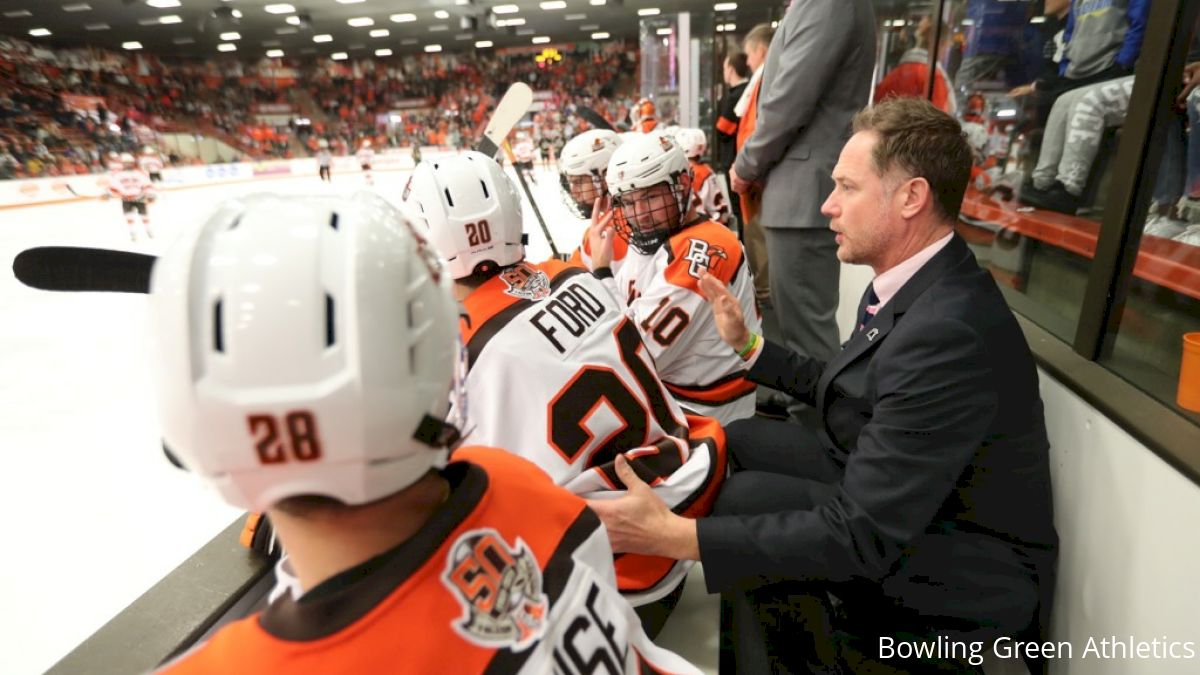Bowling Green Assistant Balkovec Talks About The Falcons' Lethal Power Play
Bowling Green Assistant Balkovec Talks About The Falcons' Lethal Power Play
FloHockey caught up with Bowling Green assistant Maco Balkovec to talk about the Falcons' elite power play.

Unless you were a British Columbia hockey insider or part of the Wisconsin high school scene, you probably hadn’t heard of Maco Balkovec since he was a point-producing defenseman for the Badgers back in the 1990s.
Over the past nine months, he has forged a name for himself once again in Division I hockey, orchestrating Bowling Green’s power play unit to an NCAA-leading 45 goals. One of his secrets is his ability to communicate effectively with young athletes. FloHockey’s Tim Rappleye caught up with Balkovec during this extended off-season.
FloHockey: How does a former defenseman run the highest-scoring power play in Division I?
Balkovec: I’ve always loved the offensive side (even though I was a D), how the goals were scored, and why they were scored. Special players are always going to make special plays — that’s a big part of it, but you have to have everybody on board. Obviously, Rau [All-American Alec Rauhauser] was the backbone; your power play has to go through your best player. You can’t just run system-based stuff, you adapt to the players and you adjust to that.
Did you help run Jeff Saur’s power play at Wisconsin?
My senior year I played on the second power-play unit, behind Brian Rafalski [USA Hockey Hall-of-Famer] who was an OK guy. Me and Mickey Elick played on D, it was a great unit. You take things from every single thing you’ve done, whether it’s breakouts, little recovers, or retrievals. When I was at Burnaby Winter Club, I worked with assistant coach Josh Bonar, a really creative power-play guy, too. We used a rotational overload, kind of like the 1-3-1 you see now. It allows everyone to move more. I don’t want a static power play; we want guys moving the puck and sharing the puck. The thing I was most proud of, is not only did we lead the NCAA in PP goals, but we led in PP assists. We were really sharing the puck.
Ty [Eigner] gave me the opportunity to run it, and he had some great insights. Curtis [fellow assistant coach Carr] had some awesome stuff. We had a great PP goal against Mankato off a set play [after] Curtis identified a wrinkle.
Connor Ford snipes a one-timer for @BGFalconHockey , one of NCAA- leading 45 PP goals for BGSU in 2019-20 pic.twitter.com/QMkllBJegA
— Tim Rappleye (@teeraps) May 4, 2020
It was all Curtis Carr. When you get those things, you got to trust those guys, trust your players.
During the season Rauhauser said you guys were always changing the system.
Teams use so much film, it’s just a cat-and-mouse game. We wanted to come out every single game, never give the same look because we know they’re watching film. We’re just trying to outguess them on what they’re doing with their scheme.
When we spoke up at Michigan Tech, you said today’s athletes get a bad rap for their communication skills.
We make the same mistake with every single generation, ‘Kids today are so entitled.’ We talk about, ‘Oh, they don’t communicate.’ I don’t think there’s ever been a generation that communicates more. They are in constant communication with one another. Now, are they having face-to-face conversations? No, but they are communicating constantly whether it’s through picture or video or audio.
I look how my son [Cole, 14 years old] plays “MLB, The Show” with his friends. He’s talking to guys on his headset, has two other guys on his iPad, and he’s playing a game. They’re compartmentalizing all these different conversations, I think they’re better at it than we are.
We have to be able to reach them [young athletes] at their level, rather than ask them to come up and talk to me at whatever level I think I’m at. If you’re teaching somebody, and they don’t get it, that’s partially on me. We have to do a way better job reaching our players where they’re at. If he’s not getting it, I must not be explaining it properly.
How does that translate to your power play?
I can send our guys at any time a clip, a highlight, a picture, a movie clip, whatever it might be, and I know they will do it. If we’re doing our job properly, we’re talking to every single kid, every single game, and giving them something. The feedback I get from them is that they really, really like it.
We took the Jackie Moon saying from that movie [Semi-Pro with Will Ferrell], “Everybody love everybody.” We wanted everybody to be part of the power play.
Tim Rappleye is the author of Jack Parker's Wiseguys: The National Champion BU Terriers, the Blizzard of '78, and the Road to the Miracle on Ice. He can be reached on Twitter @TeeRaps.